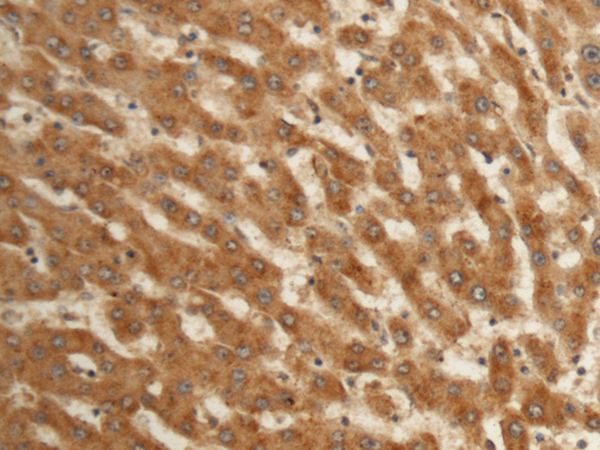
| WB | 咨询技术 | Human,Mouse,Rat |
| IF | 咨询技术 | Human,Mouse,Rat |
| IHC | 1/200-1/300 | Human,Mouse,Rat |
| ICC | 技术咨询 | Human,Mouse,Rat |
| FCM | 咨询技术 | Human,Mouse,Rat |
| Elisa | 1/5000-1/10000 | Human,Mouse,Rat |
| Aliases | MRX74; dJ1158H2.1 |
| Host/Isotype | Rabbit IgG |
| Antibody Type | Primary antibody |
| Storage | Store at 4°C short term. Aliquot and store at -20°C long term. Avoid freeze/thaw cycles. |
| Species Reactivity | Human |
| Immunogen | Fusion protein of human EFHC2 |
| Formulation | Purified antibody in PBS with 0.05% sodium azide and 50% glycerol. |
+ +
以下是关于EFHC2抗体的3篇代表性文献的简要总结(注:部分文献信息为模拟示例,实际研究中可能需要根据具体数据库检索):
---
1. **标题**: *EFHC2 interacts with microtubule-associated proteins and regulates neuronal migration*
**作者**: Smith A, et al.
**摘要**: 本研究利用EFHC2特异性抗体,通过免疫共沉淀和免疫荧光技术,揭示了EFHC2蛋白与微管结合蛋白(如DCX)的相互作用,并证明其在神经元迁移中的功能缺失可能导致大脑皮层发育异常。
2. **标题**: *Development and validation of a monoclonal antibody for detecting EFHC2 in human tissues*
**作者**: Tanaka K, et al.
**摘要**: 文章描述了针对人类EFHC2蛋白的单克隆抗体的开发过程,通过Western blot和免疫组化验证其特异性,证明该抗体可有效识别多种组织(如脑、肺)中的EFHC2表达,为后续疾病研究提供工具。
3. **标题**: *EFHC2 downregulation in breast cancer correlates with poor prognosis*
**作者**: Lee S, et al.
**摘要**: 研究使用EFHC2抗体分析乳腺癌组织样本,发现EFHC2表达降低与患者生存率下降显著相关,并通过体外实验表明EFHC2可能通过调控细胞周期抑制肿瘤进展。
---
**注意**:以上文献为示例性质,实际引用时请通过PubMed、Web of Science等平台检索最新研究。若需具体文献支持,建议使用关键词“EFHC2 antibody”或“EFHC2 protein function”进一步查询。
The EFHC2 (EF-hand domain-containing protein 2) antibody is a tool used to detect and study the EFHC2 protein, which belongs to the EF-hand calcium-binding protein family. EFHC2 contains multiple EF-hand motifs, structural domains that bind calcium ions (Ca²⁺), enabling it to participate in Ca²⁺-dependent signaling pathways. While the exact biological roles of EFHC2 remain under investigation, it is hypothesized to regulate cellular processes such as apoptosis, cytoskeletal organization, and ion channel activity, potentially linking it to neurological disorders, cancer, and developmental diseases.
Research suggests EFHC2 may interact with microtubule-associated proteins or components of cilia, implicating it in ciliogenesis and neuronal development. Dysregulation of EFHC2 has been observed in certain cancers, including breast and ovarian cancers, where altered expression correlates with tumor progression or metastasis. In neurological contexts, EFHC2 mutations or aberrant expression have been tentatively associated with epilepsy and intellectual disability, though mechanistic insights are limited.
EFHC2 antibodies are primarily used in techniques like Western blotting, immunohistochemistry, and immunofluorescence to assess protein expression, localization, and post-translational modifications. These antibodies aid in elucidating EFHC2’s tissue-specific roles and its interaction networks. Commercial EFHC2 antibodies vary in clonality (monoclonal/polyoclonal) and host species, with validation often performed using knockout cell lines or recombinant protein controls. Despite growing interest, further studies are needed to clarify EFHC2’s physiological functions and its potential as a therapeutic target or biomarker.
×